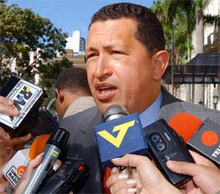 |
 |
 |
 News from Around the Americas | April 2005 News from Around the Americas | April 2005  
Venezuela's Chavez Stronger After Coup
 Associated Press Associated Press


| | Chavez dismisses accusations that he is accumulating too much power and calls himself a firm believer in democracy. |
Caracas, Venezuela - Three years after dissident generals briefly drove him from power, President Hugo Chavez is stronger than ever, but he is facing increased criticism from the United States as he moves to buy arms and more of his political foes face criminal charges.

Having survived the short-lived coup of 2002, a two-month strike that petered out in 2003 and a presidential recall referendum in 2004, Chavez and his "revolutionary" movement appear unstoppable.

"He is stronger now than he ever was in the past and has successfully managed to use each of these episodes to consolidate his grip on power," said Steve Johnson, a Latin America analyst at the Heritage Foundation, a conservative think tank in Washington.

The Venezuelan leader is maintaining his popularity as he pours millions of dollars from windfall oil prices into programs for the poor, while increasing the size of the military reserves and brushing aside criticism that his government is cracking down on dissent.

Chavez claims the U.S. government was behind the uprising that drove him from power on April 12, 2002. The United States, which denies involvement, initially blamed Chavez for his own downfall before joining other countries in condemning the ouster of a democratically elected president.

The former army paratrooper was arrested early on April 12 -- military commanders announced he resigned -- after 19 people were killed as an opposition march headed toward the presidential palace on April 11. Police protecting the opposition marchers clashed with armed Chavez supporters holding a counter-demonstration. Both opponents and supporters of Chavez were killed in the shootout.

An interim government led by businessman Pedro Carmona dissolved Congress, the courts and the constitution, angering Venezuelans of different political leanings and sending masses of Chavez supporters into the streets to demand his return.

Carmona's presidency, which lasted less than two days, was marked by persecution of Chavez allies, said Willian Lara, a pro-Chavez legislator who went into hiding during manhunts for so-called "Chavistas."

"I knew the secret police were after me, so I went into hiding in a slum with help from friends," Lara said in an interview. "Earlier, the generals leading the coup forced Chavez to give himself up by threatening to bomb Miraflores Presidential Palace, where he was holding out."

Chavez was whisked by helicopter to a Caribbean island off Venezuela's coast, where he thought he would be killed by soldiers.

"I didn't want to sign the resignation (and) they were telling the world that I had resigned," Chavez said in a recent speech.

He said he persuaded the soldiers to spare him and "a few hours later a squadron of helicopters arrived to rescue me." He returned triumphantly to the presidential palace hours later.

While the government prepares for an April 13 celebration to commemorate Chavez's return, many of his adversaries are in prison or preparing to defend themselves in court.

Those accused of crimes ranging from rebellion to treason include Enrique Mendoza, an ex-governor accused of closing the state-run television station during the coup; Maria Corina Machado, director of the Sumate nonprofit group that helped organize last year's recall vote; and Carlos Ortega, a tough-talking labor boss who led the strike that failed to oust Chavez.

Opponents say Chavez, who insists Venezuela has had no political prisoners since he took office in 1999, is using prosecutors to bring trumped-up criminal charges to try to divide the opposition and quash dissent.

Chavez's supporters call those accusations false -- and part of a U.S.-sponsored campaign to discredit the government.

Human Rights Watch recently questioned the independence of Venezuela's judicial system and urged a halt to criminal proceedings against Carlos Ayala Corao, one of dozens of Chavez opponents facing coup-related charges. The group said he is being prosecuted on trumped-up charges in "a clear-cut case of political persecution, targeting someone who has been an effective critic of the Chavez government's human rights record." Top officials dismiss the criticisms.

Since the coup, Chavez has emerged as one of the most outspoken critics of President Bush, accusing the United States of conspiring to topple his government, or even assassinate him. U.S. officials have denied it.

Both sides have said they would like to have good relations. Venezuela is the world's fifth largest oil exporter and accounts for about 13 percent of U.S. crude oil imports.

But tensions rose after Chavez said he plans to buy helicopters and 100,000 Kalashnikov assault rifles from Russia, and top U.S. officials have repeated concerns over the arms deals and the health of Venezuelan democracy.

Chavez dismisses accusations that he is accumulating too much power and calls himself a firm believer in democracy. He is running for re-election to a third term in 2006, and with no clear challengers, Venezuelans on both sides of the political divide say he likely will win. | 
 | |
 |



